Search
Showing 10 of 1867 results for how to register international groups
-
Amanda Malu appointed as Chief Executive of Education New Zealand Manapou ki te Ao
Ms Malu is currently Deputy Chief Executive Service Delivery at ACC, and formerly Chief Executive at Whānau Āwhina Plunket, leading that organisation through extensive change over five years in the role. She previously held senior marketing and communication roles including at the Tertiary Education Commission and in the polytechnic sector.
Announcing the appointment, ENZ Board Chair Tracey Bridges said Ms Malu had demonstrated strong leadership, having built united teams in pursuit of positive outcomes across the education and health sectors.
“She brings with her a deep experience in the public sector, education, and marketing, as well as experience across borders and with international education through her past roles,” Ms Bridges said.
Ms Malu will take up the role in September. Until then, the Board is delighted that Dr Linda Sissons will continue as Acting Chief Executive, as she has since November 2023.
For further information
Justin Barnett
Director of Communications
+6421875132
Notes to Editors:
About Education New Zealand (ENZ) https://www.enz.govt.nz/
Education New Zealand Manapou ki te Ao (ENZ) is the government agency dedicated to helping Aotearoa New Zealand realise the social, cultural, and economic benefits of international education. Our role is to promote New Zealand as a high-quality education destination offering excellent education and students experiences and to encourage New Zealand students to study overseas.
With approximately 110 staff in 16 locations around the world, ENZ works closely with New Zealand’s diverse education sector which includes schools, English language providers, Private Training Establishments, Institutes of Technology and Polytechnics (Te Pūkenga), and universities. Internationally, we work with a range of education stakeholders, including government agencies and education providers to identify and encourage sustainable growth opportunities for New Zealand’s education sector.
-
From the CE: Board announces new ENZ CE
Tēnā koutou katoa
Our Board yesterday announced the appointment of Amanda Malu (Ngāi Tahu) as our new Chief Executive. Amanda is currently Deputy Chief Executive Service Delivery at ACC, and formerly Chief Executive at Whānau Āwhina Plunket, leading that organisation through extensive change over six years in the role. She previously held senior marketing and communication roles including at the Tertiary Education Commission, and earlier in her career worked in marketing and international student recruitment in the polytechnic sector. Amanda will take up the role in September. Until then, I will continue as Acting Chief Executive.
This is excellent news. I am sure you will all join me in giving Amanda a very warm welcome to Education New Zealand Manapou ki te Ao and our international education community.

Amanda Malu has been appointed ENZ's new Chief Executive by ENZ's Board.
To the visit of Premier Li. Last Friday I had the privilege of attending three events held as part of Premier Li’s visit to New Zealand. Significantly, Premier Li was accompanied by Minister of Education Huai Jinpeng who led a delegation of Chinese university senior leaders and senior education officials. This is Minister Huai’s second visit to New Zealand within 12 months following his engaging contribution to NZIEC Ki Tua 2023. This is a very special recognition of the close education ties between New Zealand and China.
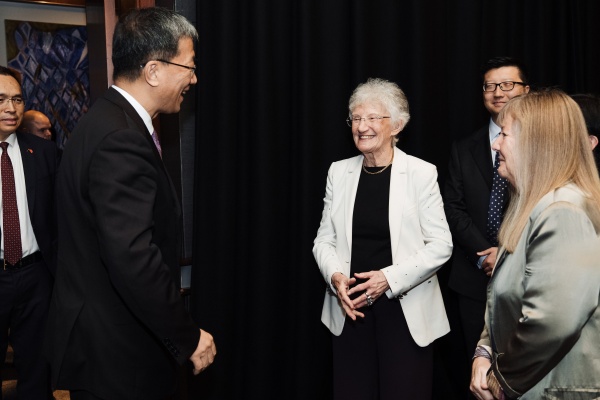
ENZ's Acting Chief Executive Dr Linda Sissons greets Minister Huai with Minister Penny Simmonds and ENZ Regional Director & Counsellor, Greater China (Education), Michael Zhang, prior to the Education Forum (held at the Pullman Hotel, Auckland)
Our Minister for Tertiary Education and Skills, Penny Simmonds and Minister Huai co-chaired a “Looking into the Future: High Level Education Forum”. The Forum was attended by 11 University Presidents from some of the most prestigious universities in China, and all eight of our university Vice-Chancellors. The Forum discussed themes spanning student and academic mobility, research partnerships, innovation and productivity and digital education. A compelling discussion topped off with the signing of twenty institution-level MOUs.
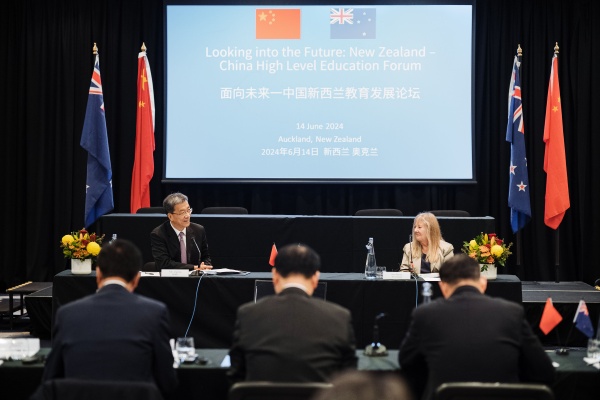
Minister Huai and Minister Simmonds open 'Looking into the Future: New Zealand - China High Level Education Forum
And towards the end of the Forum, Premier Li, our Prime Minister, the Rt Hon Christopher Luxon, as well as the Minister of Education, Erica Stanford, joined the closing ceremony and took an active part in proceedings. This included the Prime Minister presenting the latest Prime Minister’s Scholarships to a group from Canterbury University heading to China and announcing the 2024 recipients of the New Zealand-China Tripartite Research Partnership Fund. Premier Li also announced allocations of scholarships for New Zealand Chinese Language teachers, summer camp places for New Zealand students and donations of Chinese language textbooks.
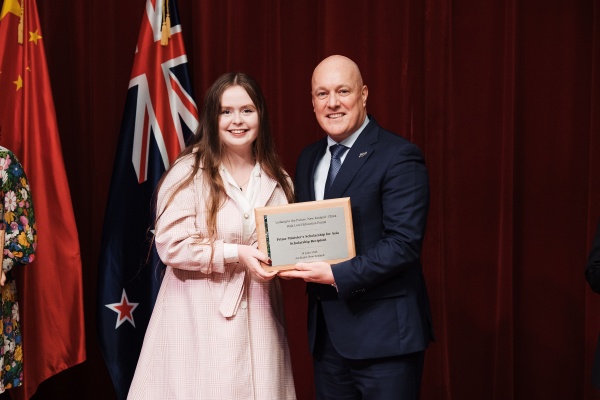
Prime Minister Rt Hon Christopher Luxon with Maia Hosking of the University of Auckland who will begin her programme in China under the Prime Minister's Scholarship for Asia.
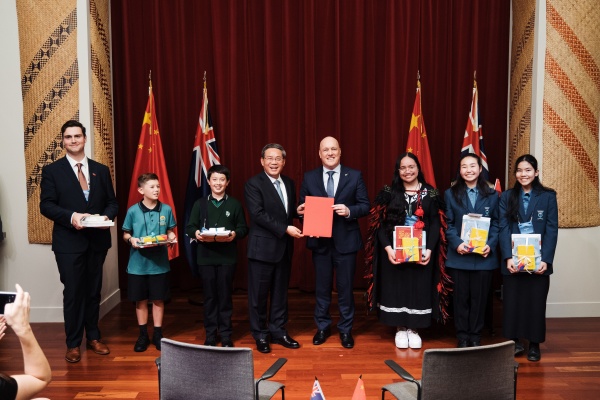
Premier Li (centre left) presents list of announcements to Prime Minister Rt Hon Christopher Luxon (centre right) on stage with six New Zealand students who received Chinese Language books
To close the day, we accompanied our Minister, our Chinese and New Zealand university colleagues, and NZ Inc representatives to the Gala dinner where Prime Minister Luxon called out education among the other vital ties between China and New Zealand.
These special events proved a unique opportunity to showcase our high-quality education offering to China while demonstrating our commitment to enhancing student mobility and future education and research collaboration. It was fantastic. We can all be very proud of education’s contribution to this important relationship.
Ngā mihi nui,
Dr Linda Sissons
Acting Chief Executive
Education New Zealand Manapou ki te Ao
-
NZ Schools Scholarship Programme offers exciting study path for Vietnamese students
The New Zealand Schools Scholarships (NZSS) is a scholarship programme offered exclusively for Vietnamese students in grades 8 – 10. Since it was first launched in 2019, many young Vietnamese students have studied at New Zealand schools across the country thanks to the support of this Programme. Many of these students have gone on to secure scholarships at prestigious universities in New Zealand and other countries, achieving notable success on their academic paths.
Applications for NZSS 2024 were accepted between 22 January to 17 March 2024 and after several screening rounds, 14 NZSS winners were selected. Each scholarship provides a 50% subsidy on the full-year school tuition fees of the first year of study at a New Zealand secondary school.
A standout aspect of this year’s programme was the dual-opportunity scheme in which aspiring candidates who did not receive the NZSS were able to be considered for other scholarships offered by New Zealand schools. This saw an additional four students awarded other school scholarships bringing the total number of school scholarship awardees to 18.
The group of scholarship winners on the stage at the Awards ceremony.
On 9 June, Education New Zealand Manapou ki te Ao (ENZ) organised the Awards Ceremony and Pre-Departure Briefing to recognise the scholarship winners as well as provide information in preparation for their journey ahead. Mr. Scott James, New Zealand Consul General in Viet Nam, attended and delivered a welcome remark, in which he emphasised the mutual respect and understanding that New Zealand and Viet Nam’s relationship is built upon.
Mr James added that “this scholarship programme signals the New Zealand Government’s continuing commitment to growing the relationship between our two countries.”
From left to right, Mr Ben Burrowes. ENZ’s Acting General Manager - International, NZSS Scholarship winner, Ngoc Han, and Mr. Scott James, New Zealand Consul General in Viet Nam.
Mr. Ben Burrowes, ENZ’s Acting General Manager – International, was also present at the event and awarded the winners a scholarship certificate and offered his congratulations. In his speech he reflected that the first eight months of 2023 saw school enrolments of Vietnamese students increase over that of 2022 to a total of 286.
“Given the care that every parent takes when deciding where their children should continue their education, the rebound for school students following the pandemic naturally took a little longer.
“We know that this number will continue to increase as life resumes its normal pattern, especially as parents look to the future, and what is best for their child’s development and education,” said Mr Burrowes.
For the pre-departure briefing, ENZ provided a brief presentation, followed by former NZSS winners, Thuy Truc (2023), Thao Nguyen (2023) and Tuan Minh (2019) sharing their study experiences with the audience. Representatives from the Vietnamese Students Association in New Zealand, Ms. Trang from HHT magazine who joined the New Zealand familiarisation trip in 2023, and Mr. Phu & Ms. Ngoc – parents of students who are currently studying in New Zealand also spoke.
Feedback from parents and students received by ENZ after the event was positive, with many commenting on how welcome and proud they felt as scholarship winners. We look forward to welcoming these students to New Zealand very soon!
-
Neuseeland still a popular destination for German High School students
Germany takes the number one spot in all of Europe for the number of international students it sends to New Zealand and the fourth largest in the world for sending high school students after China, Japan, and South Korea. In 2023, 1,417 German students were enrolled at high schools across New Zealand which represented 10% of the total number of school students in the country.
There are positive signs that this number will continue to increase in 2024. 82 high school students were recently farewelled by the New Zealand Ambassador to Germany, Craig Hawke, and Education New Zealand Manapou ki te Ao (ENZ’s) Associate Director of Engagement in Germany, Olga Elli at an event at Frankfurt Main Airport on Sunday 14 July.
The event was organised by Study Nelson, a Nelson-based education agency, that supports German students to find a high school in New Zealand, mainly in the Nelson-Marlborough area. The event was an opportunity for the students, aged between 14 and 19, to meet and engage with each other before they embark on their international study adventure. The students will spend between three and 18 months in New Zealand, depending on their programme and some plan to complete their NCEA Level 3 university entrance here.
One particularly excited member of the group included Emely Soffel, the I AM NEW scholarship winner from 2019, who due to the pandemic, had to wait five years to make her New Zealand study abroad dream come true.
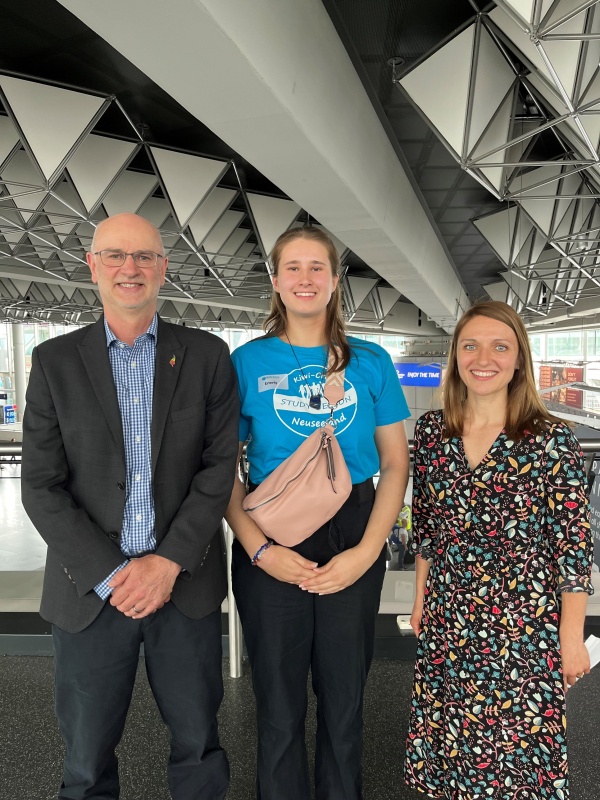
Ambassador Hawke with high school student Emely Soffel, the 2019 I AM NEW scholarship winner who was not able to travel during Covid. They are pictured here with ENZ’s Associate Director of Engagement in Germany, Olga Elli.
Olga said that Germany’s strong recovery in the high school subsector can be attributed to the experienced German agent network who have had long-standing and enduring relationships with high schools back in New Zealand.
“These agents have been building strong bridges between Germany and New Zealand for several years now, some for decades, and have made positive impacts for thousands of young people.
“They have such a deep understanding of the unique offerings that our high schools in New Zealand provide and are an invaluable service to students when trying to decide where to study,” said Olga
She added “German students love coming to New Zealand especially for the opportunity to try out subjects that aren’t typically offered at German high schools. Subjects like outdoor education, fashion design, marine biology, and food technology for example, are always really popular choices.
Ambassador Hawke mingled with the students and enjoyed hearing about their chosen schools in New Zealand. In his farewell speech to the group, he wished them a warm ‘Haere rā/farewell and said, “I invite you all to make the most of the excellent educational experience on offer in our country and also the opportunity to immerse yourself in our diverse culture. I hope you all become lifelong ambassadors for New Zealand.”
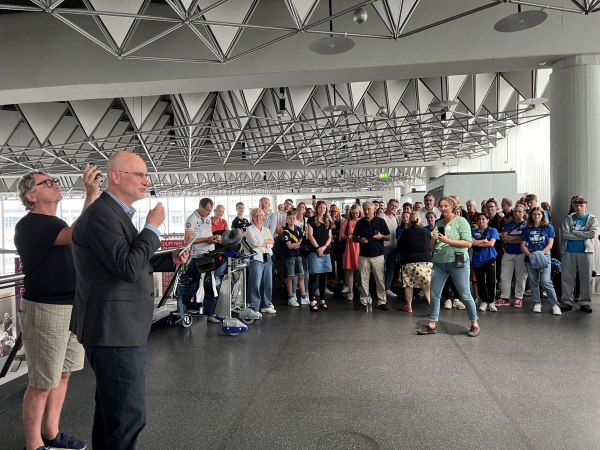
Ambassador Hawke farewells the students at Frankfurt Main Airport.
-
Māori and First Nations people connect during University of Toronto visit
18 indigenous students and two indigenous staff from the University of Toronto’s ‘First Nations House’ were invited to Aotearoa New Zealand for a week-long visit at Tirorangi Marae at the base of Mount Ruapehu in July.
The purpose of the visit was to enhance cross-cultural understanding between Māori and First Nations and Métis peoples and is significant as empowering iwi and hapū in the international education space is an important Te Tiriti obligation for ENZ, as an Aotearoa New Zealand government agency.
The visit took place during the time of ‘Puanga’ which is when the single star rises higher in the sky than the Matariki star cluster and is recognised by iwi and hapū that can’t see the Matariki cluster from their location.
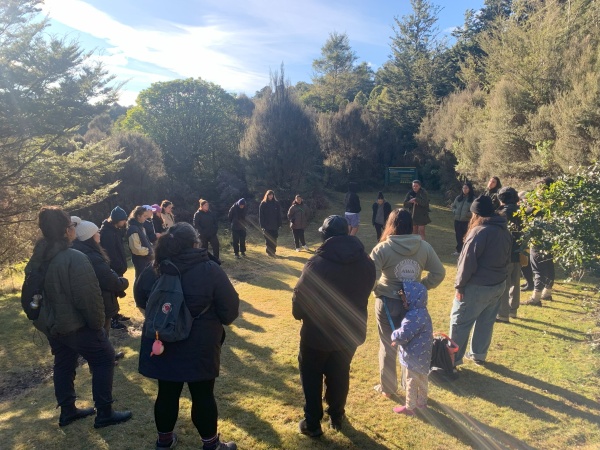
Māori and First Nations and Métis people have ’sharing circles’ as a common way to teach and learn.
The group participated in a wide range of activities in the area while staying at the marae. They were then welcomed to Te Whanganui-a-Tara by the ENZ Wellington office, visiting Te Tiriti o Waitangi at Archives New Zealand Te Rua Mahara o te Kāwanatanga and and Te Herenga Waka — Victoria University of Wellington, before finishing their trip in Whakatū (Nelson) with some adventure tourism activities.

Indigenous students Kieren and Bailey from the University of Toronto sampling Wellington’s outdoors with ENZ's Craig Rofe.
The First Nations and Métis members of the group experienced what living on a marae was like and were also immersed in how a tribe engages with the environment, and how iwi businesses, local council and government agencies such as the Department of Conservation (DOC) operate in the field with iwi partnership.
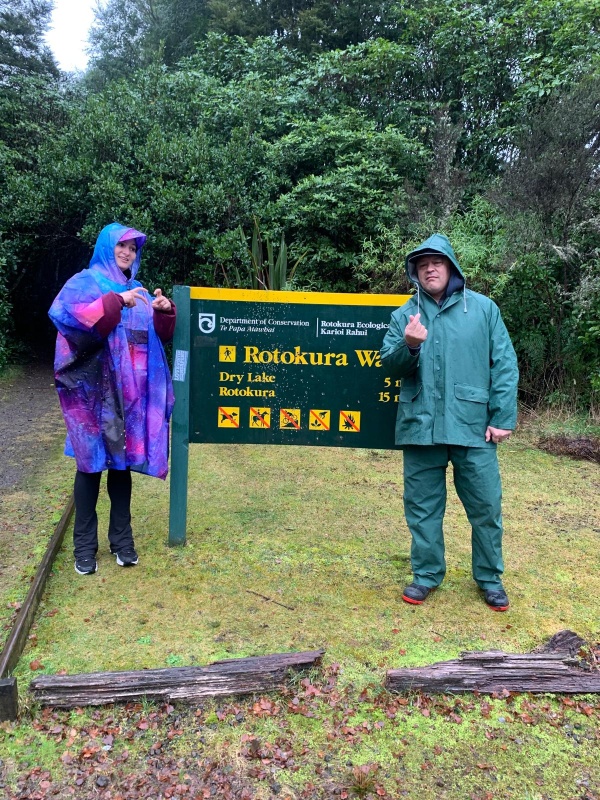
Iwi people sharing lake Rotokura’s healing power, a wāhi tapu (sacred place) for the local tribe.
Dr Craig Rofe, ENZ’s Kaitohutohu Matua Māori – Senior Advisor Māori, said that during the visit, Māori and First Nations and Métis people were able to compare the similarities and differences of their contexts to grow understand of their respective challenges and successes.
“The First Nations people’s struggles to overcome racism and prejudice resonated with tangata whenua, in particular the intentional elimination of language and the current mechanisms of revitalisation.
“Many stories shared with together showed the everyday trauma that resides in each of us and how, as indigenous people, we try to navigate these obstacles to make a better world for the next generation”, said Dr Rofe.
The trip motivated the students to connect more with their languages and culture upon their return.
Kenzie, from the Mohawk tribe said “when we meet again, I’ll be able to talk to you in my language, I’m declaring it!”.
Katherine from the Eskasoni First Nation tribe said “My experience connecting with the Ngāti Rangi revealed the transformative power of global Indigenous connections. Participating in ceremonies such as Hautapu and visiting Mount Ruapehu was particularly moving. Listening to their stories of ancestral ties to the land and taking part in traditional ceremonies that emphasized community and connection to the environment deepened my own personal understanding. This experience inspired me to initiate conversations with elders in my own community about our traditional land management practices.”
This experience also highlights the important offerings that Māori, and indeed indigenous knowledge, has to offer to international education. In particular, and not exclusively, the deep connection that indigenous peoples have with the environment and therefore natural obligation of care.

First Nation student, Alexis, discovers the origins, medicinal, spiritual and mechanical properties of harakeke (flax).
Sustainable practices and programmes can benefit from indigenous inclusion and perspectives, especially with the large-scale impacts of global warming and general pollution in many countries. The co-governance structure that Ngāti Rangi iwi and DOC work with as part of post Te Tiriti Settlement was used as an example of decolonised solutions within our New Zealand context.
There have been discussions between ENZ, Ngāti Rangi iwi, and the University of Toronto about an ongoing relationship and considering what a reciprocal engagement might look like moving forward.
Nāku te ika i hī, nāku anō i whakatau
Ki te haere, whāia i te Pare-i-te-taitonga, tērā taku ika.
This is a Ngāti Rangi iwi reference to the Ruapehu mountain being the ‘pillar post’ of the ‘Fish’ (North Island).
-
INZ student visa update: August 2024
Post Study Work Visa – cross crediting study from post graduate diploma to masters
Provided eligibility is met, most level 8 post graduate diplomas will be eligible for a one year post study work visa (PSWV) with masters graduates eligible for a three year post study work visa.
In order to be eligible for a PSWV, post graduate diploma (level 8) and masters qualifications (level 9) require a minimum of 30 weeks full time study in the specific programme/qualification being presented for a PSWV.
Students must have held a student visa for that programme/qualification and apply for their PSWV within three months of the expiry date of the student visa for qualification they are presenting to INZ.
Recently some students completed post graduate diplomas (PG dip) and cross credited directly into a taught masters. In these cases, the students did not undertake full time study in the masters for a minimum of 30 weeks full time in New Zealand, due to the cross credited PG Dip.
This resulted in issues for the graduates when they applied for their PSWV. INZ is working directly with affected students and exploring options for them. However, it is important for agents and education providers to understand the PSWV rules.
Eligibility for Post Study Work Visas following study at level 8 and 9 are:
- a minimum of 30 weeks full time study in that specific qualification,
- hold/held a student visa for that specific qualification, and
- apply for their post study work visa within three months of the student visa expiry for that specific qualification.
Although the initial coursework of a masters might be similar to, or the same as a post graduate diploma, the two programmes have different entry criteria and are recognised as separate qualifications. For students who want to cross credit their PG Dip to a masters and undertake some extra study in order to gain a three year PSWV for that masters, the student would need to have studied the masters itself full time for at least 30 weeks.
Note: Study weeks include exam preparation time, but exclude holiday periods and time spent repeating failed components.
We will continue to engage with the education sector to ensure they are aware of the requirements for a post study work visa. If you have questions about this article and are an agent or student, please talk to your education provider in the first instance.
Student visa peak – apply three months before intended travel
The processing of international student visas is a key focus for INZ, particularly as we get closer to the end of the year.
We are now coming into the period in which INZ receives the highest volumes of applications.
As soon as they have all the documents they need to apply for their visa, students should submit their application three months before their intended travel date to give them the best chance of having their application decided in time. They can apply earlier than three months if they wish, as long as they have all the required information and documents.
Our visa processing times are published on the INZ website and updated monthly: Visa processing times for international students
New fees and levies for visas come into effect from 1 October 2024
Earlier this month, the Government announced that the cost of applying for all visas will increase on 1 October 2024.
Until now, the immigration system has been heavily subsidised by taxpayers.
The new fees have been set at a rate to recover the costs of assessing and processing each visa type and more accurately reflect the total service surrounding the immigration system.
Student visa fees increase from $375 to $750. The post study work visa fee increases from $700 to $1670.
Student visa fees differ depending on where the student applies from so be sure to check the new fees and levies here.
It is also important to note that New Zealand does have agreements with some countries where student visa fees are waived, and these remain. You can find information here.
INZ is receiving questions from the education sector on whether students can apply for visas now at the lower fee, and upload documents later once they are ready.
Applications received before 1 October 2024 will be charged the current fee, however if the applications are not ready for assessment because they are missing documents then this will result in delays or disappointment for the student.
INZ will not be contacting applicants if documents are missing from the application and, if the missing information is key to the assessment, then the applications may be declined.
Please make sure you are advising students to submit their visa application when it is complete and ready for assessment. For more information, please see the student visa information sheets here - Student visa information | Immigration New Zealand
-
ENZ seeks Expressions of Interest to grow the Thai schools’ sector
In 2023, enrolments from Thailand were the fifth largest for New Zealand’s schools with most enrolments coming from students living in Bangkok. Education New Zealand Manapou ki te Ao (ENZ) is now looking to grow this market by collaborating with New Zealand schools and regional Thai education agents to build partnerships with schools in cities outside the capital city (referred to as ‘second tier’ cities).
The initiative, called the Thailand Second Tier City Promotion is planned to run in 2025-2026. ENZ is currently seeking feedback from New Zealand schools to measure interest in participating in the promotion and is running a survey until Tuesday 30 October 2024 for interested schools.
Collaborative school clusters are invited to participate in the initiative which will form sister school partnerships with regional Thai schools. Each cluster should consist of at least three schools.
Through these partnerships, a wide range of study options for Thai students and schools will be available. This may include short-term 4-week school immersion programmes, 1 to 2 terms or full year study programmes, teacher trainings, virtual interaction, online curriculum-based collaborative projects etc.
ENZ’s Acting General Manager - International, Mr Ben Burrowes, said that over the years New Zealand has built a very strong reputation as a high-quality education destination particularly amongst students from Bangkok. He says that this helped the market rebound significantly post-Covid.
“With the international education market in Bangkok now highly saturated, ENZ sees this promotion as a good opportunity to help schools reach an untapped market in regions across Thailand.
“Through working with high performing regional education agencies and in collaboration with New Zealand schools, our initiative aims to support the development of sister school partnerships in each province,” said Ben.
“This is a strategic move to raise the profile of New Zealand’s school sector and grow interests from a new pool of prospective students and their parents,” added Ben.
If your school is interested in exploring this opportunity, please fill out this survey by Tuesday 30 October to help us match your interest with our upcoming initiative. Additional information can be found in this document. If you have any questions, you can email these through to NZ’s Market Manager – Philippines & Thailand, Chortip Pramoolpol Chortip.Pramoolpol@enz.govt.nz.
-
Update from Immigration New Zealand
Peak processing season in full swing
Immigration New Zealand (INZ) has seen an increase in applications submitted during September 2024, ahead of the 1 October visa fee and levy increase and because of our ‘apply early’ messaging.
In September 2023, approximately 3,104 international student visa applications were submitted and in September 2024, approximately 6,893 international student visa applications have been submitted, an increase of 122%.
Now that we are in our peak processing period, we expect these processing times to grow as we receive a higher volume of applications. Students should get their visa application in at least 3 months before they plan to travel to New Zealand for the first semester of 2025.
By now, most students should have received an offer of place from their chosen education provider. Anyone expecting to study in the first term of 2025 should apply now.
We acknowledge that some students who are waiting on key study documentation are unable to apply 3 months ahead. In these cases, they should apply as soon as they have all of their documents, but they need to be aware that late applications may not be processed in time for them to start studying.
Immigration New Zealand has three student processing sites in New Zealand, and has allocated more staff to processing student visas, compared to last year’s peak.
Ensure you submit a complete applicationTo avoid delays, we encourage students, agents and advisers to follow the advice in our student visa information sheets. If they do not include all the required documents when they submit their application, it may be declined.
Applications that have a statement of purpose letter written by the student, telling us about their personal circumstances and plans in New Zealand, help us assess their intent. If a student intends to apply for another visa after study, they should declare this. Students are allowed to apply for another visa after they finish studying.
-
New Zealand-China Early Childhood Education Symposium to be hosted in New Zealand for the first time
The fifth annual New Zealand-China Early Childhood Education Symposium – themed around digital transformation in early childhood education – is set to take place at Te Whare Wānanga o Waitaha | University of Canterbury (UC) in Christchurch on 3 December.
This is the first time that the symposium will be hosted in New Zealand.
A 31-strong delegation from China across 21 universities, schools, kindergartens and government agencies will attend the event.
Co-organised by Education New Zealand Manapou ki te Ao (ENZ), the China Center for International People-to-People Exchange (CCIPE) of the China Ministry of Education and UC, the symposium will see at least 25 presenters and 80 attendees from New Zealand and China present on a range of topics related to digital transformation in early childhood education. Audiences in New Zealand and China will also attend the symposium virtually.
Broad topics this year include emerging opportunities and challenges of artificial intelligence in teachers’ work in early childhood education, the use of digital technologies for early childhood education assessment, and digital transformation for communication and collaboration with families.
The event aims to foster academic exchanges and cooperation in early childhood education between New Zealand and China.
In June, during the visit by Chinese Premier Li Qiang and Education Minister Huai Jinpeng to New Zealand, UC signed a partnership agreement with the CCIPE at the New Zealand-China High-level Education Forum in Auckland. UC is also a current New Zealand-China Tripartite Partnership Programme recipient with two Chinese partners, Shanghai Normal University and Qufu Normal University, around early childhood education.
ENZ Acting General Manager International Ben Burrowes said the symposium highlights the long and fruitful bilateral engagement between New Zealand and China across a number of education areas.
“I am delighted to have New Zealand host the event for the first time. We have seen the symposium grow and go from strength to strength over the last five years and nurture relationships between our early childhood education providers.
“I look forward to hearing from presenters across the education landscape in both our countries sharing insights on digital transformation in early childhood education,” Burrowes said.
The University of Canterbury is honored to be the first tertiary institution in New Zealand to host the symposium, says Professor Joce Nuttall, Executive Dean of UC’s Faculty of Education Te Kaupeka Ako.
“As a university committed to future-focused education and the creation of meaningful local and global impact, the symposium is an invaluable opportunity for UC to engage in discussions with peers across New Zealand and China on the future of early childhood education between our two countries.”
Since 2020, the New Zealand-China Education Symposium has explored a rich range of themes and inspirational presentations on early childhood education, including exploring best practice for developing high-quality early childhood education teachers, and sustainable development in early childhood education and care.
For further information:
Justin Barnett | Director of Communications, Education New Zealand
+64 21 875 132
-
New Zealand universities continue to top world sustainability rankings
The 2025 QS World University Rankings: Sustainability were released yesterday, highlighting that New Zealand’s universities continue to lead the way when it comes to environmental, social and governance sustainability. The rankings by QS Quacquarelli Symonds are in their third year and measure an institution’s ability to tackle the world’s greatest sustainability challenges.
New Zealand came out top country overall based on the average score of our universities for Environmental Impact and Governance, in addition to the Equality and Environmental Education lenses (among countries with at least eight universities ranked). This is good news for universities as they look to attract students to their campuses especially as QS Destination: Australia and New Zealand report 2024, found that 63% of students interested in studying in New Zealand say environmental sustainability was very or extremely important.
Ben Sowter, QS Vice President, said: “New Zealand’s higher education sector has long been a world leader in sustainability and this year’s results show yet again that the country punches above its weight, surpassing many of its international competitors.
“However, this year’s results also show that universities in other countries are improving their sustainability efforts, with New Zealand’s institutions advised to enhance their offers in areas of governance, employability and outcomes and health and wellbeing.”
The 2025 rankings showcase over 1,740 universities from 107 countries and territories. This reflects significant growth from last year’s rankings which included 1,397 institutions across 95 locations and more than 1,000 institutions since the inaugural rankings in 2022.
Jessica Turner, CEO of QS said that “The QS Sustainability Rankings provide a critical benchmarking tool for universities to evaluate their progress across areas such as knowledge exchange, equality, environmental impact, and governance. As more institutions engage with this framework, the increasing competitiveness of the ranking reflects the growing commitment globally to advancing sustainability in higher education.”
The full rankings can be found on the QS website here: QS World University Rankings: Sustainability.*
QS Quacquarelli Symonds
QS Quacquarelli Symonds is the world’s leading provider of services, analytics, and insight to the global higher education sector, whose mission is to empower motivated people anywhere in the world to fulfil their potential through educational achievement, international mobility, and career development.
The QS World University Rankings portfolio, inaugurated in 2004, is the world’s most popular source of comparative data about university performance.

